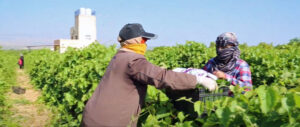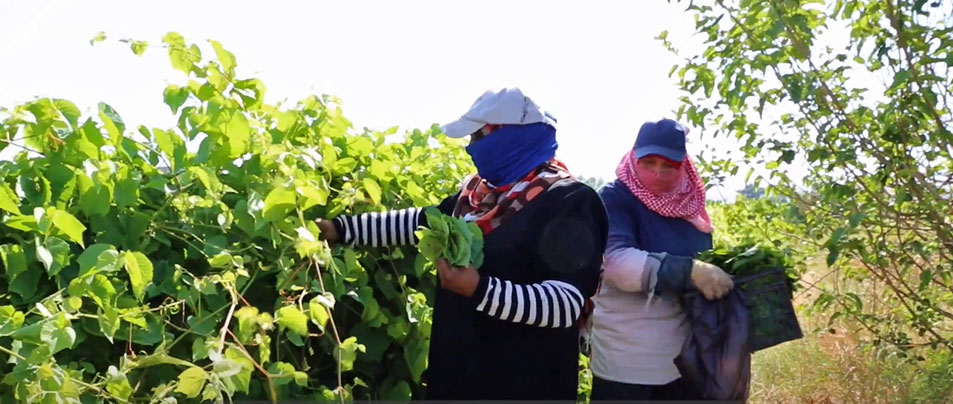Agricultural workers in Jordan for the first time have fundamental protections on the job, including guarantees for safe and decent working conditions, following a two-year campaign by the Agricultural Workers Union in Jordan and its allies that resulted in passage of a historic regulation covering the agricultural sector.
“This is quite a landmark in Jordan. It’s the first time this type of legislation has passed,” says Hamada Abu Nijmeh, director of the Jordan-based Workers’ House for Studies. Under the regulation, any provision not mentioned falls under purview of national labor code.
The law applies to all workplaces that employ more than three agricultural workers, who now will receive 14 days annual paid leave and 14 days paid sick leave (or more, in cases of serious illness). Women are guaranteed 10 weeks paid maternity leave and there are now first-ever provisions for overtime pay. Significantly, the legislation also covers migrant agricultural workers, who frequently are not protected by countries’ labor laws.
COVID-19 Makes Visible Essential Workers

Agricultural workers in Jordan were key to developing the new labor regulation improving wages and working conditions.
Prior to passage of the regulation this month, there were no mandated safety inspections of farming facilities, leaving workers vulnerable to dangerous and unhealthy working conditions, such as exposure to poisonous pesticides. Agricultural workers, most of whom do not have formal labor contracts and are part of the country’s vast informal economy, were paid extremely low wages with no health insurance or other social protections. Working long hours, they were not guaranteed a day off during the week and not paid overtime. They were denied the freedom to form unions—the Agricultural Workers Union is not recognized by the government. Migrant workers still do not have the right to form unions under the new law.
Although a labor law covering agricultural workers was passed in 2008, the government never moved to put it in place, says Mithqal Zinati, union president. But as the COVID-19 pandemic highlighted essential workers like those who literally feed the world, the government became more receptive to the union’s campaign to ensure decent working conditions in the vineyards and fields.
“The agricultural sector is the food basket, the key source of stability that needs to be given priority to contribute to the stability of Jordanian state itself,” says Abu Nijmeh. “Part and parcel of that is to provide protection of workers. We told [the government] if you want to see this sector successful, you need to provide its protection.”
Abu Nijmeh and Zinati spoke with the Solidarity Center through interpreters.
Danger on the Job and Getting to Work
For Jordan’s 210,000 agricultural workers, more than half of whom are women, the day begins before dawn as they rush to meet the crowded trucks that transport them to the fields in the fertile Jordan Valley. Picking cucumbers, melons and okra in summer, citrus fruits in winter, the workers also weed fields, install water pipes and spray crops. They often are denied breaks, even as they work in the burning sun and harsh cold, and women have no access to toilets, leaving many with serious kidney issues and other illnesses, says Zinati. Just this week, a worker died of sun stroke in the fields, Zinati says.
Before they even arrive at the farms, women are subject to unsafe conditions on the packed vehicles they must use to get to work. Some 86 percent say they were involved in an accident on the commute, and 41percent say they are subjected to sexual harassment and other forms of gender-based violence during the journey, according to a study by SADAQA, a nonprofit organization championing the rights of women in Jordan. SADAQA produced the study, “Women Agricultural Workers in the Jordan Valley: Conditions of Work and Commuting Experiences and Challenges,” with Solidarity Center support.
Twenty or more workers are packed in a van licensed for five passengers, sitting on top of each other and in the luggage compartment, says Zinati. The vans take back roads to avoid police because they are not licensed, or licensed only to transport crops and other goods, and workers frequently suffer injuries as the overcrowded vehicles crash on the rough roads. Because most women work in shifts, they must commute two times per day, says Randa Naffa, SADAQA co-founder, speaking through a translator.
Together with the Solidarity Center, SADAQA produced a video on the outcome of the study documenting the hazards women face commuting to the fields. SADAQA, part of the Alliance to End Gender-Based Violence and Harassment in the World of Work, is using the video to campaign for regulations covering agricultural transport. The alliance is pushing the government to ratify International Labor Organization Convention 190 on ending gender-based violence and harassment at work. Convention 190 makes clear that employers and governments must take measures to ensure workers are safe on their work commute as well as in the physical workspace.
Worker Involvement Key to New Regulation
Agricultural workers were key to designing the new regulation. Beginning in 2019, leaders at the union and the Workers’ House met with workers on the farms to determine their needs and priorities. With worker input forming the basis of the draft regulation, campaign leaders applied labor regulations and human rights provisions from international standards and legislation from other countries to create a model regulation. The Workers’ House and the Solidarity Center then organized a meeting of agricultural workers to discuss the draft again and plan campaign steps, including social media outreach.
They formed a coalition with civil society organizations to launch an advocacy campaign that included petitions and public statements to the Ministry of Labor and other government officials which, along with social media outreach to mobilize public support, was key to moving the government to pass the regulation protecting these essential workers.
“I heard from the Ministry of Labor they said they were listening to, keeping abreast of what was spread in the media,” says Abu Nijmeh.
“The regulation that has just been promulgated, we hope it will protect female workers in this sector and it is the opportunity to create the political will to recognize the importance of women’s contributions to the agriculture sector and the importance of women’s contributions to other informal sectors,” says Naffa.
Worker Education Essential for Success
Abu Nijmeh, Zinati and Naffa all emphasized the need to ensure implementation and enforcement of the new regulation, especially workplace inspection, safety and health and child labor. Under the new regulation, children younger than age 16 cannot work in agriculture and those between ages 16 and 18 can only be engaged in non-hazardous work.
The regulation “shall never be enforced without pushing,” says Naffa. “We need to lobby more, engage in campaigns, reach out to the Labor Ministry, the Transport Ministry.” Key to its success is widespread education of agricultural workers about their rights, says Zinati.
A long-time union organizer who began by unionizing court workers in Beirut, Lebanon, Zinati says union committees are now set up in every village, and literacy classes and other education opportunities are offered so workers can better champion their rights.
“If I see people who are done an injustice, who are oppressed, the only way for them to gain their rights is for them to unite,” he says. “This legislation opens the horizon so workers can play a bigger role in pushing their rights,” he says.

